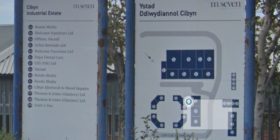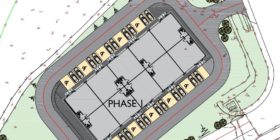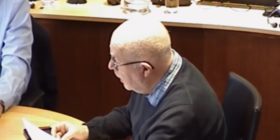“Difficulty of Welsh language” sees wills being processed in England and court cases being moved from Caernarfon to Chester

Welsh and English speaking Gwynedd councillors have strongly backed calls for a devolved system of justice for Wales.
Difficulties over Welsh language wills being processed in England and court cases being moved from Caernarfon to Chester were highlighted during a debate over a shake-up of Wales’s justice system.
Whilst raising a notice of motion, Councillor Elfed Wyn ap Elwyn told the full council meeting of Cyngor Gwynedd that Wales was:
“The only country in the world with the ability to create legislation – but with no legal jurisdiction of itself.”
The Councillor for Bowydd and Rhiw proposed the council called for the Westminster Government to handover control of the courts, prisons, police, probation and other legal processes,
Speaking in the Dafydd Orwig chamber, on Thursday, June 6, he said the “complexity” arising from the existing justice situation meant that “difficulties” arose between the Senedd and Westminster with policies conflicting.
“The Senedd uses its budget to pay for service it has no powers over, as well as expensive court cases to resolve the issues,.
“It is responsibility without power.” He said.
“Many negative changes have occurred in the legal system in Wales with 23 crown courts closing, meaning more people have to go further for justice, which has a huge impact on communities and rural areas.
“The money to provide legal support to people in need has also been cut which has meant many suffer health and mental health problems from anxiety and worry over court cases, that has led to greater strain on the National Health Service.
“We need to devolve powers over justice, and create a new legal system it would mean that Wales could develop a better legal service for the people of Wales.
“Scotland and Northern Ireland have their own legal jurisdiction, as well as the Isle of Man, Jersey and Guernsey, even areas of England have more powers over elements of law than Wales.
“It’s time for our nation to be given the same powers, to get rid of the complex existing current situation.”
It was also “important” for the council to “move the national issues forward for the benefit of the people,” creating a “key discussion,” he added.
“My notice of motion calls on the Westminster Government to devolve powers over justice (the Courts, Prisons, the Police, the Probation Service and other associated powers) and create a Welsh Legal Jurisdiction.” He said.
It was seconded by Councillor Dafydd Meurig.
In a vote, 43 were in favour, two abstentions, and none against.
During a discussion, Councillor Elin Hywel said there was a “huge flaw” in the way Wales worked.
“It’s essential for our legal system to reflect our values and who we are, how we would like to see things working.
We are the voice of our people, that voice needs to be heard.” She said.
Cllr Craig Ap Iago said “…obviously I support it. What we are asking for here is for more control over ourselves, the establishment in England is against that.
“We don’t just want independence, we need the power over everything to look after ourselves.”
Cllr Rhys Tudor said it was currently “an England and Wales thing.”
“It’s not uncommon for somebody having their court case moved from Caernarfon to Chester, outisde the country boundary.
“The probate office that works for Wales is in Harlow, England. If you send a Welsh will – best of luck to you! They ask you to translate it for them!
“We have an administration that is not knowledgeable about Wales. We have the courts, the infrastructure, but the whole systems that governs it is in the grip of middle England.”
Cllr Dewi Jones supported the notice “100 percent” and Cllr Stephen Churchman welcomed it warts and all” and Cllr Walker Jones “strongly” supported it.
She cited inequalities of justice between England and Wales, saying there was ” less offending in Wales, but more imprisonment, especially women for some reason,” She said.
The youth justice service also did “excellent ” work keeping young people out of prison, but was “subjected” to two sets of regulation from England and Wales.
“It’s complete nonsense.” She said.
In one example, during an inspection, she told the meeting “it hadn’t struck them they’d need to provide a Welsh inspectorate, and in Gwynedd of all places.”
By BBC LDRS
Spotted something? Got a story? Email News@News.Wales











